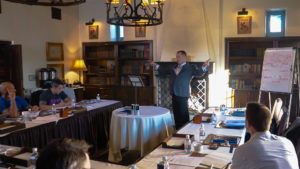How does self-awareness help you become a better leader?
As a coach working with business leaders, I aim to have conversations that evoke awareness. Once in a state of awareness, a pause is created for reflection and discussion. This pause is when we begin to live in choice.
But that begs the question, how do I create awareness? Is this just something that happens with age? With experience? With success or failure?
Those are all valid questions, and the answer is: it depends.
Humans are complex, individual, and unpredictable. There may be no one small event, situation, or interaction that accelerates the process of awareness. What works for one may have a different impact on the next person.
The following TED Talks are a few of my favorites that talk about how to improve self awareness as a leader.
The Power of Self-Awareness with William L. Sparks
Many in our culture focus on playing to our strengths, deflecting what we are not good at, and focusing on our natural talents.
Sparks contends that honest self-awareness begins in the darkness. With a nod toward accountability, ownership, reflection, and vulnerability, he shares a painful story that changed his life forever.
So, how does self-awareness help you become a better leader? Listen for the gap between the situation’s stimulus and the choice of responses. In particular, the professor’s guidance is a powerful lesson not only for those receiving feedback but also for those coaching.
Increase your self-awareness with one simple fix by Tasha Eurich
Organizational psychologist Tasha Eurich spent years researching what it means to be self-aware. She defines self-awareness as the ability to see ourselves clearly as the world sees us.
95% of people believe themselves to be self-aware, but when measured, that number is between 10% and 12%
There are two types of people: those who think they’re self-aware and those who are. In her research, 95% of people believe themselves to be self-aware, but when measured, that number is between 10% and 12%.
Watch this talk to learn more about the incredible personal and professional outcomes of self-awareness and how to be a better communicator.
Ronald “Tre” Prescott – Self-awareness
Behavioral Interventionist Tre Prescott discusses the correlation between sports and life lessons.
As a business coach, I often use similar analogies.
Mr. Prescott reflects on building awareness by playing a sport. Sports teach us how to win, lose, collaborate, recover, and have human connections.
Watch this talk for a new perspective, using your journey in sports as part of your current awareness.
Nancy Ekpezu – Why Self Awareness Is a Super Power
Nancy Ekpezu describes her journey of self-discovery as using the power of awareness to fuel her success.
Her willingness to look within, accept information, and change behavior is a key reason she has succeeded.
As a coach, she recognized that she benefits from having her own coach and mentor. Receiving objection input from others gives her a perspective that is valuable by being actionable.
Fin Sheridan – Are you self-aware or just self-absorbed?
After all, the only difference between drowning and diving is whether or not you come back up.
How confident are you in your strengths, so much so that you would plant a stake in the ground and declare them? Our self-awareness is knowing how we are received in the world and our ability to manage it. Here, this EQ Leadership expert offers tools to become more aware.
Emma MacDonald – Learning from the self, for the self: a process of self-reflection.
Among the most courageous things anyone can do is to accept feedback that leads us to look inward.
Not only does Ms. MacDonald recount how others were receiving her in the world, but she takes those harsh descriptions, owns them, and uses the time away to compare how she is with how she would like to be. Hers is a journey of raw reflection and redirection toward intentional living.
Process + People = Profit
At Leader’s Cut, we contend that the equation Process + People = Profit. This means that when a leader/owner/entrepreneur systematizes their operations (i.e., their unique approach to business) and humanizes their leadership (i.e., pairs core values with hiring and leading their team), the result is the competitive advantage they always intended when founding their business.
A key element of working together is evaluating, building, and consistently developing soft skills, one of which is self-awareness. It is impossible to overstate the positive outcomes resulting in your self-awareness as a leader and its impact on your work environment when you foster the same within others.
You’ll note that several talks point out that we generally overestimate our awareness. Our work in executive communication coaching also encounters teams that rate themselves highly but test closer to the 10% range. Furthermore, they initially resisted the evaluation of experts in the field.
The good news is that working with an engaged leader or team can yield powerful results. If you’d like to kick the tires and see if we connect, schedule a 15-minute meet-and-greet. If you’re ready to evaluate the coaching experience at Leader’s Cut, the Breakthrough Strategy Session is for you.




